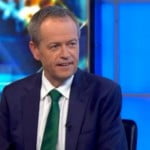MALCOLM Turnbull and Scott Morrison are cracking down on the big four banks by forcing them to “front up” to a parliamentary committee every year.
The Prime Minister and Treasurer today announced their plan to set up a system where the banks will appear before a House of Represtantatives standing committee on economics annually.
They said the heads of the four major banks will have to give “a full account of the way in which they are managing their affairs, their dealings with customers, their interest rate policy” and any other issues.
Under this new process, the banks will report in the same way that the Reserve Bank of Australia and APRA currently appear before the committee on a regular basis.
Mr Morrison and Mr Turnbull said they have consulted the four major banks — ANZ, Commonwealth Bank, National Australia Bank and Westpac — as well as the governor of the Reserve Bank, the ACCC and APRA.
Mt Turnbull said this will “create a regular and permanent method of accountability and transparency for the banks”.
“This is a great opportunity for the banks because it’s an opportunity for them to explain how they deal with their customers, explain why they make their interest rate decisions and, in doing so, by being open and honest and accountable about it, what they will do is build confidence in their banks so it’s a great opportunity for them but it’s also an opportunity for parliamentarians and that committee and the Australian people who may respect to hold them to account,” he said.

Prime Minister Malcolm Turnbull Treasurer Scott Morrison are trying to get the four big banks to be more accountable for their actions. Picture: Jason EdwardsSource:News Corp Australia
The announcement comes after the Reserve Bank dropped interest rates to record lows, and the banks passed on only half of its 0.25 per cent rate reduction.
Mr Turnbull said it will change the culture at Austrlaia’s banks.
“They’re going to have to front up to a House of Representatives committee and explain that and take questions about that and justify their actions in front of the elected representatives of the Australian people and that will — I tell you, that will drive some cultural change at the banks,” he said.
It comes after Opposition Leader Bill Shorten mocked Mr Turnbull over his handling of the major banks’ failure to pass on the latest official interest rate cut, saying he has to decide whether he is the prime minister for banks or for all Australians.
The Labor leader has increased demands for a royal commission into the banking sector as Mr Turnbull took the banks to task for not passing on the cut, demanding an explanation from the banks’ chief executives.
But Mr Shorten called it “empty rhetoric”.
“Mr Turnbull needs to be less talk and more action on bringing the banks to account for their arrogant conduct,” Mr Shorten said.

Opposition leader, Bill Shorten arrives in Sydney for a meeting with Malcolm Turnbull. Picture: John FederSource:News Corp Australia
But senior Liberal James McGrath again dismissed the need for a royal commission.
“You don’t need a royal commission to find out that banks are sometimes greedy, they are,” Senator McGrath told Sky News.
“What we need is the banks to be better.” The banking industry also hit back, saying a royal commission would send the wrong message to the world about the stability of Australian financial institutions.
Labor has repeatedly called for a royal commission in the wake of a string of financial scandals which have hit thousands of mum and dad investors.
But Australian Bankers’ Association chief executive Steven Munchenberg said a royal commission was unnecessary because the institutions were already dealing with the issues.
“It’s better for us to be fixing those problems now than waiting for some drawn out royal commission,” he told ABC radio.
A former Reserve Bank board member backed the need for an inquiry into banks, insisting the quality of financial advice they provide needs to be examined more closely.
“Their authority in that area is becoming vastly bigger than it was even a decade ago, and I think that’s where we need to get a better idea of what the culture is and how good the performance and practice is,” John Edwards, who was economic adviser to former Labor prime minister Paul Keating, told ABC television.
Independent federal MP Andrew Wilkie said the central bank wanted to kickstart a slowing economy and the banks needed to do their part.
“It’s not like they are scraping for cash here, they are making enormous profits and should pass (the rate cut) in full,” Mr Wilkie told Sky News.
[source :-news]




